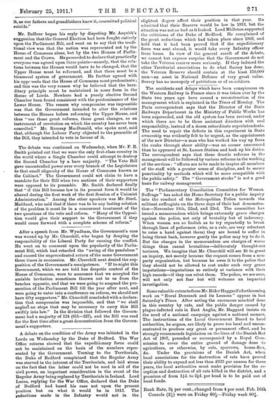A debate on the condition of the Army was initiated
in the Lords on Wednesday by the Duke of Bedford. The War Office returns showed that the expeditionary force could not be maintained on the basis of the numbers repre- sented by the Government. Turning to the Territorials, the Duke of Bedford complained that the Regular Army was starved in the interest of the Territorials, and laid stress on the fact that the latter could not be used in aid of the civil power, an important consideration in the event of the Regular Army being replaced by Territorials in Ireland. Lord Lucas, replying for the War Office, declared that the Duke of Bedford had based his case not upon the present position but on what it would be in 1913. The reductions made• in the Infantry would not in the
slightest degree affect their position in that year. Ile admitted that their Reserve would be low in 1913, but the situation was not so bad as it looked. Lord Midleton supported the criticisms of the Duke of Bedford. He complained of the great reductions which had taken place since 1903, and held that it had been proved that if the expeditionary force was sent abroad, it would take every Infantry officer from home. In view of the general result of the debate, we cannot but express surprise that the Government do not take the Veteran reserve more seriously. If they induced the other Territorial associations to do what Surrey has done, the Veteran Reserve should contain at the least 150,000 men—an asset in National Defence of very great value. Surrey has no monopoly of patriotism or of ex-soldiers.






































 Previous page
Previous page